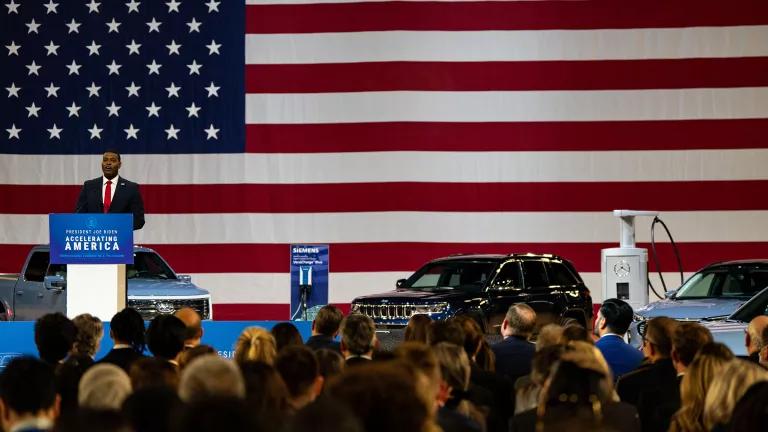
In the closing hours of a one-month legislative session in New Mexico, a filibuster prevented votes on a number of bills, including on bipartisan legislation that would have provided consumers incentives to support electric vehicle (EV) purchases and the installation of charging stations. That policy would have invested a few million dollars in lost revenue to help the state realize $30 billion in avoided expenditures on gasoline and maintenance, reduced utility bills, and environmental benefits by 2050.
The bill would have:
- Established a $2,500 income tax credit for the purchase or lease of a qualifying EV
- Provided lower and moderate-income households a $5,000 credit
- Established a $300 credit for installing a home EV charger
- Expired the credits in 2025
Driving on the average electricity mix in the U.S. is already more than twice as clean as driving on gasoline. And New Mexico has one of the most aggressive renewable energy requirements in the nation, which means the emissions benefits will only increase in the state. Powering EVs with that increasingly clean electricity is an essential strategy to meet the state’s climate goals, improve air quality and protect drivers from volatile prices at the pump.
Incentives to support EV adoption are a smart investment for the state, will help consumers and will complement the state’s efforts to adopt Clean Car Standards that will ensure EVs are available for purchase in the state. They also build upon the state’s efforts to increase access to EV charging. The state’s rural electric cooperatives have proposed an ambitious plan to leverage funds available as a result of the Volkswagen diesel scandal to build a state-wide public fast charging network. Additionally, New Mexico’s investor-owned utilities will soon propose transportation electrification investments as required by legislation NRDC supported last year that Governor Lujan Grisham signed into law.
The filibuster that denied a vote on a number of bills represents a failure of legislators to do the job they were elected to do. The EV tax credit bill would have helped consumers in the state, regardless of party affiliation.
That said, in its final form, the bill wasn’t perfect. Amendments made in the short legislative session would have partially undercut the positive impact of the policy. One amendment would have established an excessive $100 annual increase in registration fees for EVs meant to make up for lost gas tax revenue. That’s more than twice what a driver of an efficient gasoline vehicle pays annually in gas taxes in the state. According to analysis done by Consumer Reports, that $100 annual fee is “punitive,” would hurt New Mexican consumers, and would do virtually nothing to address the real sources of transportation funding shortfalls in the state. New Mexico needs a fair and comprehensive solution that addresses all the sources of transportation revenue loss while not undermining efforts to reduce dependence on gasoline. New Mexico doesn’t index gas taxes to inflation and hasn’t increased gas taxes for nearly 30 years—so, in real dollars, gas taxes have been declining for more than a quarter century! There is a solution to this: for more, see A Simple Way to Fix the Gas Tax Forever.
Likewise, amendments made to ensure that consumers would not “abuse” the tax credit by repetitively leasing EVs (a theoretical problem that has never been observed in states that have adopted similar EV incentives) meant consumers who lease EVs could only claim a third of the incentive per year for three years instead of being able to claim its full value upfront. Because 80 percent of EVs are acquired on leases and because the further the incentive is from the point-of-sale, the less impact it has on purchase decisions, that requirement would make the tax credits less effective than as originally proposed (as credits that could be claimed in full the first year or transferred to the dealer or bank so it at their full value so they would act like “cash-on-the-hood”).
We hope the bill will return next year, without the unfortunate amendments. Good policy sometimes takes a while to prevail, but we will keep up the fight. New Mexico shouldn’t be left behind as the world goes electric, and should act as soon as possible to reap the $30 billion in net-benefits recent analysis finds would result from widespread EV adoption in the state.



